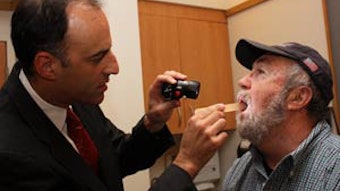ICD 10 : What It Means for Your Practice
Rhonda Buckholtz ICD-10 implementation will bring many hurdles in to our practices. Staying on top of the upcoming changes will be your best defense for successful implementation. ICD-10 codes are still in draft format, meaning the codes, guidelines, and clarifications will change. You can imagine the frustration, that you and your practice may encounter as you try to implement ICD-9-CM changes while simultaneously learning the continuously changing ICD-10-CM codes. In order to accommodate a more stable learning environment, the Centers for Medicare and Medicaid Services (CMS) announced a code-set freeze. As a result, the last regular and annual updates to both ICD-9-CM and ICD-10 code sets will be made on October 1, 2011. On October 1, 2012, there will be only limited code updates to both the ICD-9-CM and ICD-10 code sets to capture new technologies and diseases. On October 1, 2013, there will be only limited code updates to ICD-10 code sets to capture new technologies and diagnoses. There will be no updates to ICD-9-CM, as it will no longer be used for reporting. On October 1, 2014, regular updates to ICD-10 will begin. What does the Code Set Freeze mean for your practice? After October 1, 2011, you may begin learning the new codes as they will be stable. (Generally, I recommend that you and your staff wait until closer to the final ICD-10 implementation date to learn the code sets to ensure better retention of them.) Your vendors will have a stable platform with which to work from to develop and update coding related products such as encoders, computer-assisted coding. I recommend that you work with vendors early to see what changes you may need or additional programs that might be required for implementation. The ICD-9-CM Coordination and Maintenance Committee will continue to meet twice a year during the partial freeze. These meetings are important to attend and participate in during the transition to ICD-10-CM. At these meetings, the public is asked to comment on whether or not requests for new diagnosis or procedure codes should be created based on the criteria of the need to capture a new technology or disease. Any code requests that do not meet those criteria will be evaluated for implementation within ICD-10 on and after October 1, 2014, once the partial freeze has ended. Academy staff plans to cover ICD-9-CM Coordination and Maintenance Committee meetings where ENT specific codes will be discussed and reported back to members. You and your staff may begin to prepare now by staying well aware of changes and how they will affect your practice. We have delineated some simple strategic steps below: Perform an ICD-10-Readiness Assessment to see if your documentation will stand up to the new code set. More information about a readiness assessment can be found at http://www.aapc.com/ICD-10/documentation-readiness.aspx. Take a visual tour of how ICD-10 will affect your practice. The AAPC has a provider floor plan that outlines impacts in each business area at http://www.aapc.com/ICD-10/office-map/index.aspx. Stay on top of the ICD-9-CM Coordination and Maintenance Committee meetings. The next one will be held on September 14 in Baltimore, MD, at the CMS headquarters. CMS open the phone lines for questions. ICD-10 implementation will not only affect your practice’s coding but also other aspects of your operation; early preparation is necessary. If you choose to gamble and hope for delays, you may have revenue shortfalls requiring a line of credit or need several months’ expenses saved to cover you until your claims can be ICD-10 compliant. CMS has vehemently indicated there will be no delays in the ICD-10 transition. The agency has been working diligently with other organizations to prepare providers. ICD-10 implementation is like no other change you have ever faced in healthcare. If you cannot submit a compliant ICD-10 claim you will not get paid. ICD-10 implementation is not a quick fix and could take larger practices several years to accomplish. Even in smaller practices, reflective of many otolaryngologists’ practices, careful impact analysis is necessary for successful implementation. Please use your resources wisely over the next several years for ICD-10 implementation. Review vendor plans for implementation. Testing will be necessary closer to implementation, and getting on vendor schedules will be important. Staying abreast of the changes will require some effort, but by following a few strategic steps you can enjoy a stress- free ICD-10 implementation. Buckholtz is vice president of Business Development and Member Relations for American Academy of Professional Coders. A seasoned coder and coding educator, she previously served AAPC as director of local chapter relations and as a member of the organization’s National Advisory Board. She is a certified coder and PMCC coding instructor, and speaks frequently at coding conferences. She is the owner of Coding and Reimbursement Experts, a Pennsylvania coding consulting service, and teaches coding at the Venango campus of Clarion University. Prior to her employment with AAPC, Buckholtz was administrator for Wolf Creek Medical Associates, managing a five-location, multi-specialty practice, and was business manager at an otolaryngology practice. Don’t miss Rhonda’s mini-seminar, “ICD-9 Transition Hurdles to ICD-10 Diagnostic Coding,” (moderated by Richard W. Waguespack, MD) on Wednesday, September 14 from 10:30-11:50 @ Moscone Center, Room 309. Visit,http://www.entannualmeeting.org/index.php/education for more details.
Rhonda Buckholtz

ICD-10 codes are still in draft format, meaning the codes, guidelines, and clarifications will change. You can imagine the frustration, that you and your practice may encounter as you try to implement ICD-9-CM changes while simultaneously learning the continuously changing ICD-10-CM codes.
In order to accommodate a more stable learning environment, the Centers for Medicare and Medicaid Services (CMS) announced a code-set freeze. As a result, the last regular and annual updates to both ICD-9-CM and ICD-10 code sets will be made on October 1, 2011.
- On October 1, 2012, there will be only limited code updates to both the ICD-9-CM and ICD-10 code sets to capture new technologies and diseases.
- On October 1, 2013, there will be only limited code updates to ICD-10 code sets to capture new technologies and diagnoses. There will be no updates to ICD-9-CM, as it will no longer be used for reporting.
- On October 1, 2014, regular updates to ICD-10 will begin.
What does the Code Set Freeze mean for your practice?
After October 1, 2011, you may begin learning the new codes as they will be stable. (Generally, I recommend that you and your staff wait until closer to the final ICD-10 implementation date to learn the code sets to ensure better retention of them.)
Your vendors will have a stable platform with which to work from to develop and update coding related products such as encoders, computer-assisted coding. I recommend that you work with vendors early to see what changes you may need or additional programs that might be required for implementation.
The ICD-9-CM Coordination and Maintenance Committee will continue to meet twice a year during the partial freeze. These meetings are important to attend and participate in during the transition to ICD-10-CM. At these meetings, the public is asked to comment on whether or not requests for new diagnosis or procedure codes should be created based on the criteria of the need to capture a new technology or disease. Any code requests that do not meet those criteria will be evaluated for implementation within ICD-10 on and after October 1, 2014, once the partial freeze has ended. Academy staff plans to cover ICD-9-CM Coordination and Maintenance Committee meetings where ENT specific codes will be discussed and reported back to members.
You and your staff may begin to prepare now by staying well aware of changes and how they will affect your practice. We have delineated some simple strategic steps below:
- Perform an ICD-10-Readiness Assessment to see if your documentation will stand up to the new code set. More information about a readiness assessment can be found at http://www.aapc.com/ICD-10/documentation-readiness.aspx.
- Take a visual tour of how ICD-10 will affect your practice. The AAPC has a provider floor plan that outlines impacts in each business area at http://www.aapc.com/ICD-10/office-map/index.aspx.
- Stay on top of the ICD-9-CM Coordination and Maintenance Committee meetings. The next one will be held on September 14 in Baltimore, MD, at the CMS headquarters. CMS open the phone lines for questions.
ICD-10 implementation will not only affect your practice’s coding but also other aspects of your operation; early preparation is necessary. If you choose to gamble and hope for delays, you may have revenue shortfalls requiring a line of credit or need several months’ expenses saved to cover you until your claims can be ICD-10 compliant. CMS has vehemently indicated there will be no delays in the ICD-10 transition. The agency has been working diligently with other organizations to prepare providers.
ICD-10 implementation is like no other change you have ever faced in healthcare. If you cannot submit a compliant ICD-10 claim you will not get paid. ICD-10 implementation is not a quick fix and could take larger practices several years to accomplish. Even in smaller practices, reflective of many otolaryngologists’ practices, careful impact analysis is necessary for successful implementation.
Please use your resources wisely over the next several years for ICD-10 implementation. Review vendor plans for implementation. Testing will be necessary closer to implementation, and getting on vendor schedules will be important.
Staying abreast of the changes will require some effort, but by following a few strategic steps you can enjoy a stress- free ICD-10 implementation.
Buckholtz is vice president of Business Development and Member Relations for American Academy of Professional Coders. A seasoned coder and coding educator, she previously served AAPC as director of local chapter relations and as a member of the organization’s National Advisory Board. She is a certified coder and PMCC coding instructor, and speaks frequently at coding conferences. She is the owner of Coding and Reimbursement Experts, a Pennsylvania coding consulting service, and teaches coding at the Venango campus of Clarion University. Prior to her employment with AAPC, Buckholtz was administrator for Wolf Creek Medical Associates, managing a five-location, multi-specialty practice, and was business manager at an otolaryngology practice.












